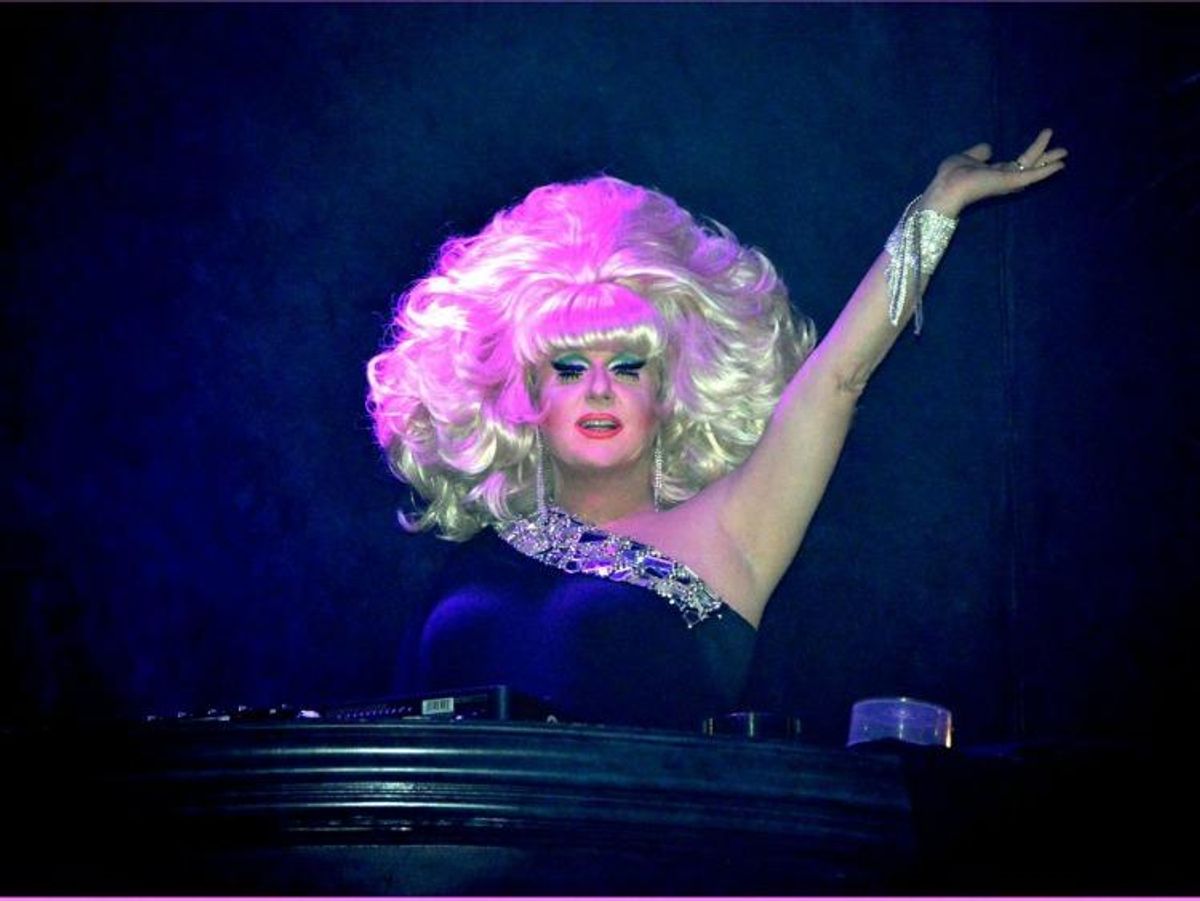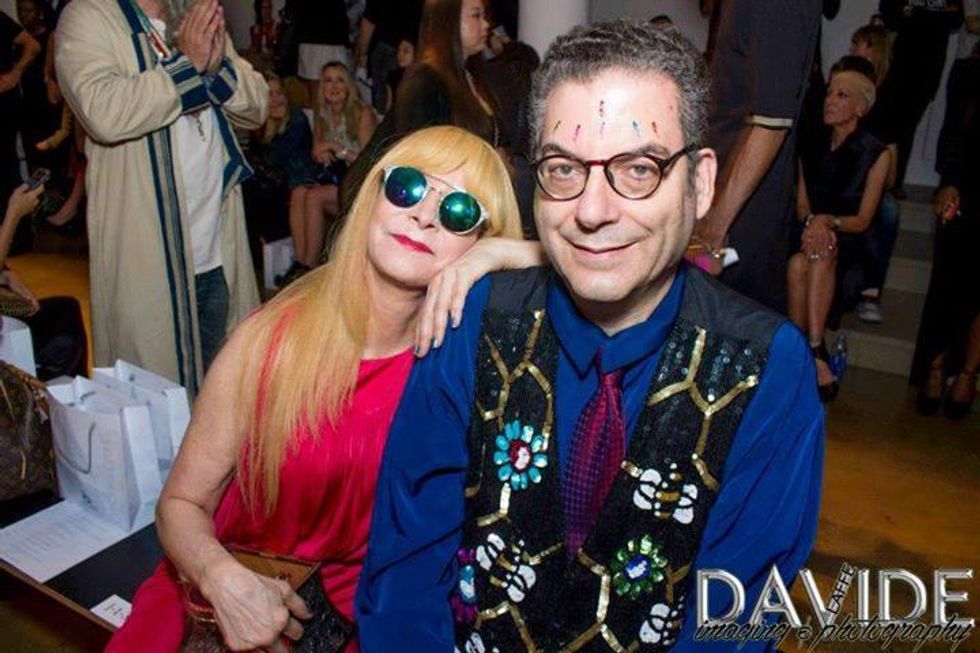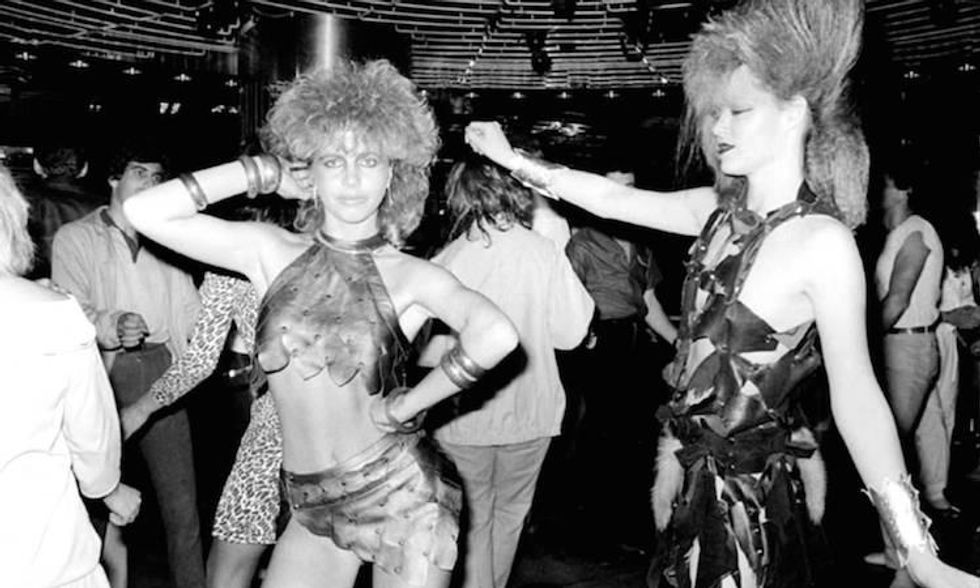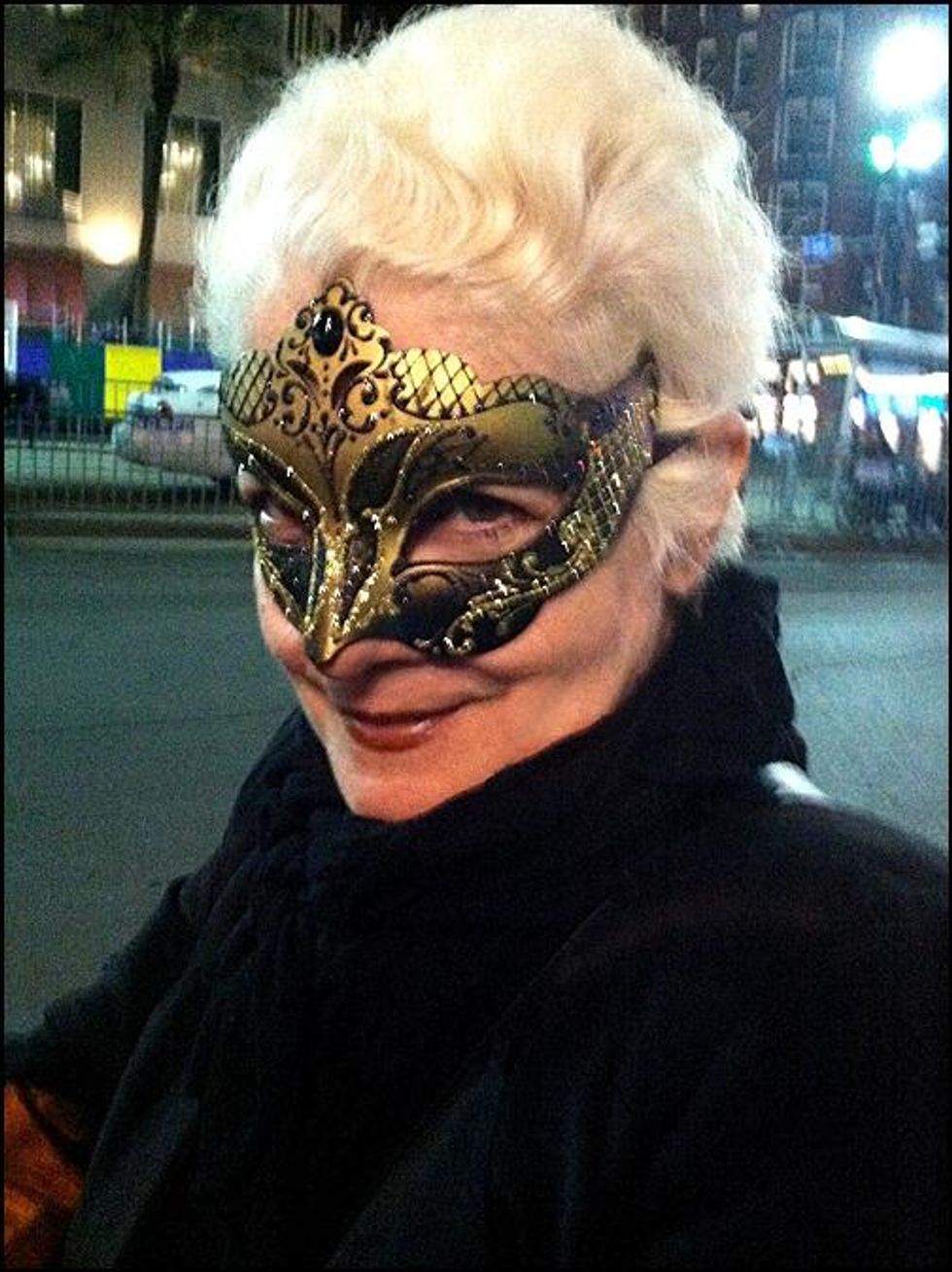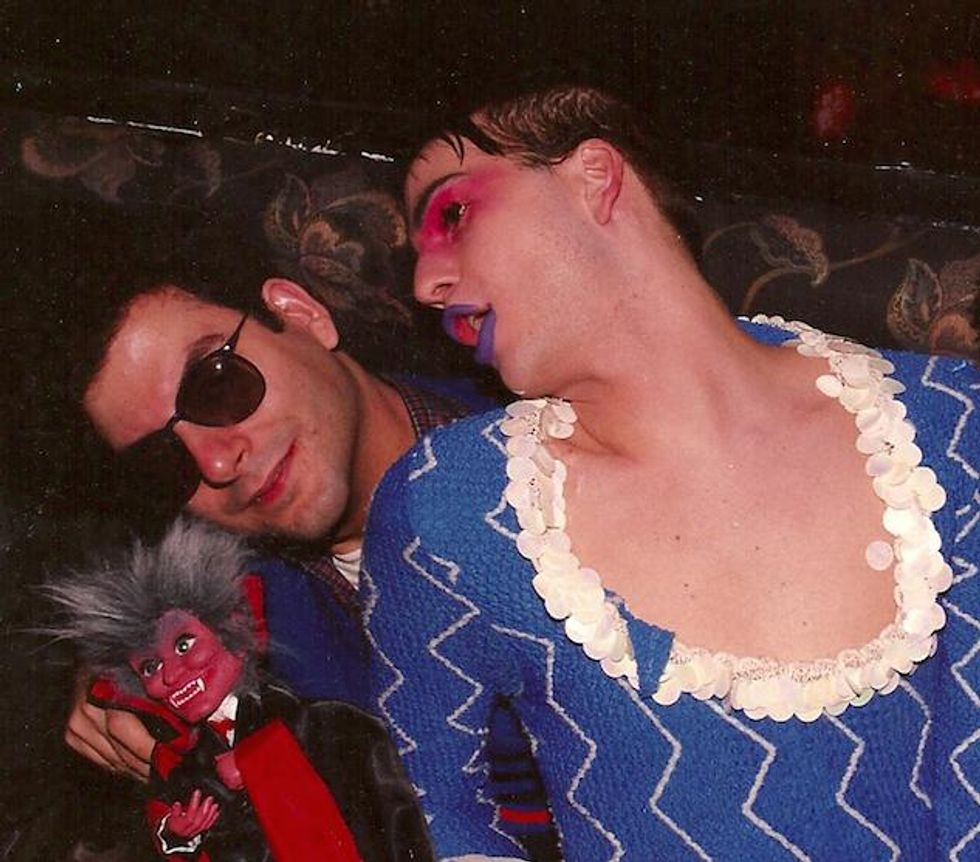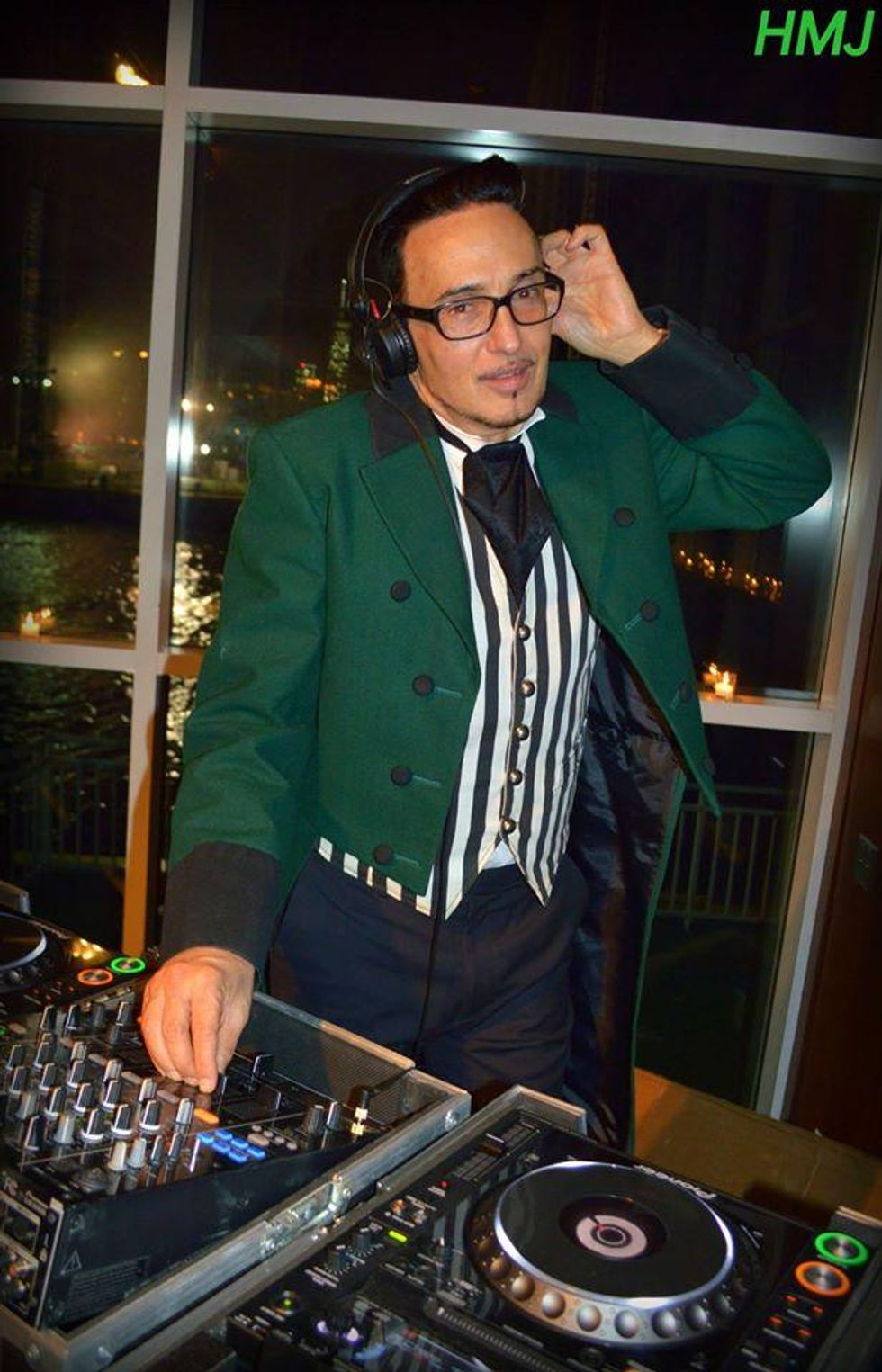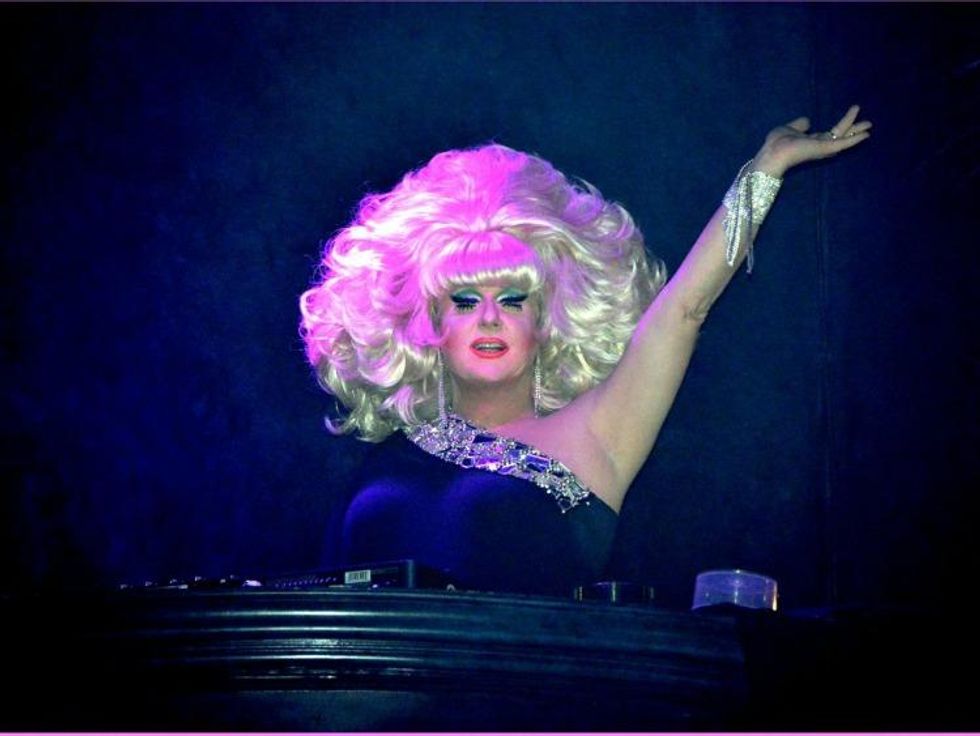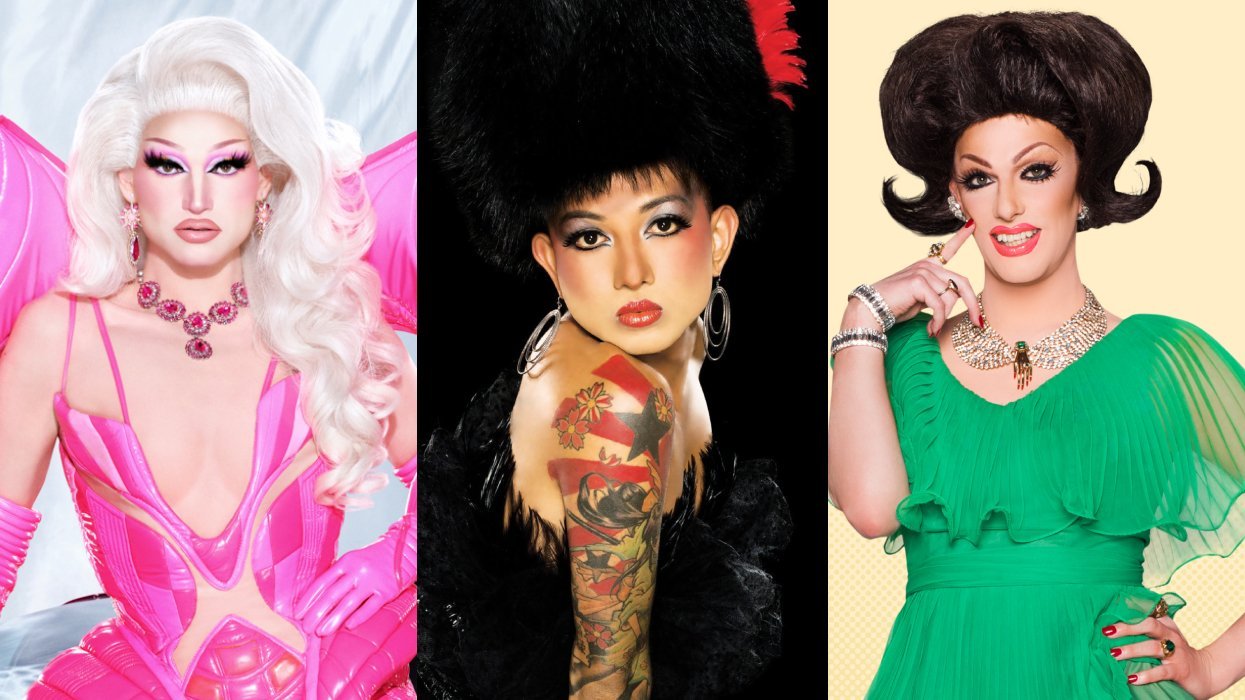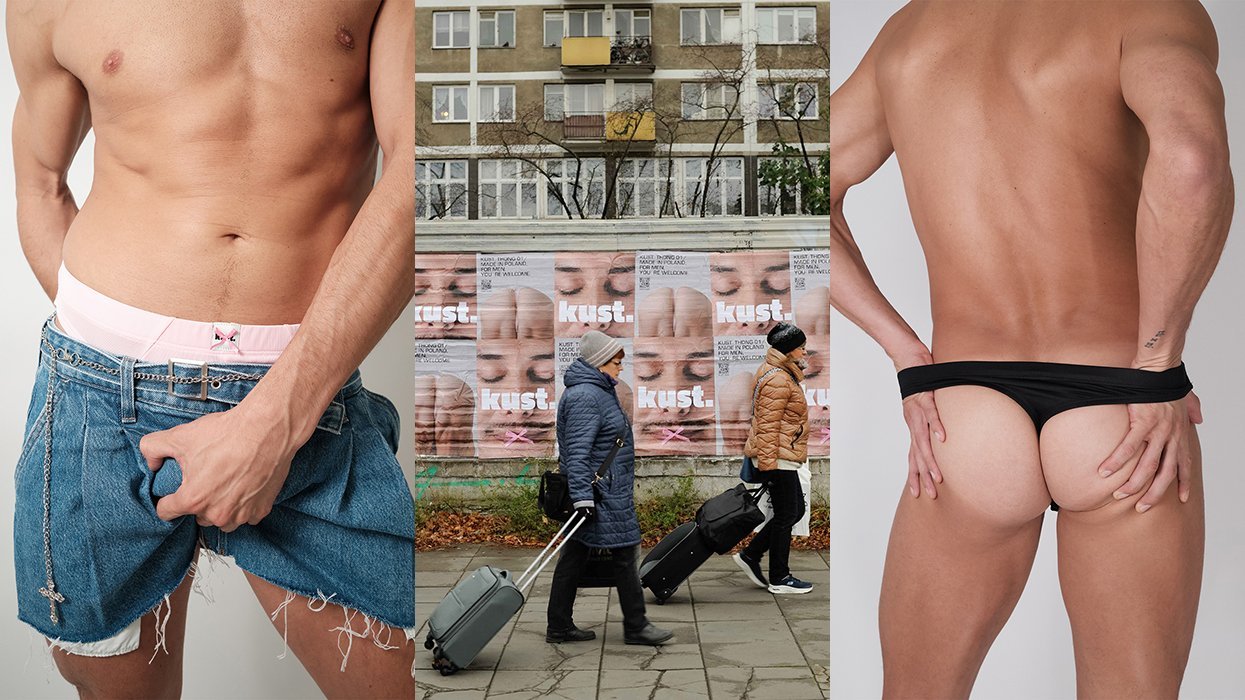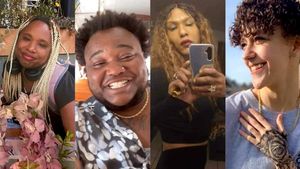One of my worst fears is to become a cobwebby Norma Desmond-type looking through old photos and misting up about the days when clubs used to be better. That being said, clubs used to be better. It's not just that in the past, we were all younger and everything seemed fresh and new (though that's definitely a factor). It's that NYC wasn't as focused on being a glossy, safe haven for tourists and rich residents, community boards didn't have as much power to deny dance licenses, and the Internet wasn't around to move the party online instead of in your face. Before emails, texting, and tweeting, you actually had to leave the house for most personal interactions. And before sex apps and hookup sites, there was way more of a sexual urgency in clubs and bars. Now, some people who go out can't wait to get home, click around on their phone, and get some action.
Blissfully enough, I was around for the glory days of 1970s disco (when celebrity hedonism was king at glittery thump-thump palaces like Studio 54) and the "celebutante"-filled era of mega clubs in the '80s (when budgets were high and art was part of the expenditure), and I even remember it! From 1994 to 2001, the Giuliani-era brought us gentrification and uppity bottle service, though every action has a reaction, so vital NYC nightlife continued to bubble under, albeit under the new rules and oppressions that made partying more self conscious. Jump ahead and miraculously enough, there are still dance clubs to be found--though they're all pretty safe, with everyone way more rule- and work-conscious than in the past.
To wax profound about past glories (and horrors), I assembled a group of brilliant club survivors at the Cutting Room, where music and burlesque acts keep things current. Our original discussion happened a while ago, so I've asked the participants to update their comments and make things extra relevant. Here are their back stories:
Chi Chi Valenti and Johnny Dynell cofounded the legendary Jackie 60 event (which ended up at their Mother club), from 1990 to '99. The party--which enforced strict dress codes based on esoteric references--fused fetishistic chic, performance, and heady themes for a mix that elevated clubbing into very high art. They also host the annual Night of 1000 Stevies event, which honors twirling, poncho-laden songstress Stevie Nicks, and Dynell DJs at many clubs around town.
Anita Sarko was a DJ at the Mudd Club (a fabulous counterculture answer to Studio 54 from 1978 to 1983, way down in the then-wasteland of Tribeca). She also DJ'd the Mike Todd room in the sprawling Palladium in the '80s. Anita continues to DJ internationally and is also a writer.
And Lady Bunny has performed and DJ'd on the scene for years, and is known for having created and hosted Wigstock, the gigantic outdoor drag festival that put New York in high heels from 1984 to 2005. She appeared on RuPaul's Drag U on Logo.
Sitting with that crowd of legends over Diet Coke and cold cuts (which no one ate), I gave a live dramatic reading of my above remarks about the shift in club culture and asked for responses.

Sarko and Musto
MUSTO: Well, in the 1970s, after Watergate and Vietnam, the country was demoralized and in horrible economic shape and everyone decided to just check their minds at the door and party in a big, glorious way. We're all disillusioned and facing economic challenges today too, so why don't we have another Studio 54?
ANITA SARKO: In the '70s, people ran in and out, so you had cheap housing. But as long as you price out young people and artists, and heavy drug users--people who traditionally do not have money--how can they live in the city? Now they can't afford Brooklyn. They have to live so far away that to get to a club becomes a regular event.
LADY BUNNY: Exactly. I saw this club kid working probably for minimum wage at a chain boutique, and I think, "Where do these people live?" Also, because of the Internet, they think, "Oh, well, I can see [transsexual star] Amanda Lepore perform on YouTube."
MUSTO: Well, I walk into [promoter] Susanne Bartsch's parties, for example, and the room is filled with outrageously dressed, fun people. We can't discount the fact that these people do exist. But I do wonder how they afford it. I think they're having to actually work day jobs. They're not living off the trust funds and they're not just winging it anymore. Is it boring that we have fabulous club kids who aren't on an amorality spree?
JOHNNY DYNELL: The whole country is very Left Coast-oriented right now. The girls talk like Valley Girls--you know "Oh my gahd..." They're nasally challenged. It's very shopping mall. I mean, 7-11s in the East Village?
CHI CHI VALENTI: And people used to need a physical, bricks-and-mortar space, a club, a clubhouse, a scene. But now, it's so expensive to do the ongoing scene, and people don't need it in the same way because of all the online stuff.
MUSTO: And it's more about documenting the moment...
CHI CHI: Than creating the moment.
BUNNY: Jackie 60 was one of the only clubs that I would go out to and just have a blast. And y'all closed it and said, "We're going online to have a virtual community," and I was like, "Fuck you. I can't drink a virtual drink and I can't suck a virtual cock!" But you were right. You started off with the Motherboards [their chat site], which is essentially Facebook. You predicted it! And at Jackie, I was blazing drunk and high and carrying on and wasn't worried about no damn camera! At a Sirius party at Studio 54 a few years ago, every time the silver spoon set piece came down or a scantily clad dancer came out, everyone had their cell phones out. They weren't dancing, they were standing on the dance floor!
ANITA: It all has to do with bragging rights. [Back then], everybody became their own creation. We were all the centers of our world.
JOHNNY: You know who saw all this coming? Andy Warhol. It's just the fame thing. Everybody wants to be a celebrity, and that's what Facebook is. You take your phone and take a picture of yourself making that kissy face.
MUSTO: Studio 54 existed in a bubble that could never be recreated because it never had that technology, plus it was your one-stop shopping for cheap thrills. The celebrities did their drugs in the basement, they got glitter thrown in their eyes on the main floor, they got a blowjob on the balcony, and then they went home to their boyfriends or girlfriends.
JOHNNY: Allegedly.
MUSTO: Meanwhile, the Mudd Club was the anti-54, but it had its own surreal fabulousness.
ANITA: I was always rock, punk...as far away from disco as I could possibly get. So, walking into Mudd Club, I knew right away this was my home. It wasn't a bunch of people in Spandex, grinding to little dances they learned at some dance studio, listening to this thump-thump, with some female singer shrieking about how someone left her and what they were going to do to them.
MUSTO: Don't mess with my Gloria Gaynor! [laughs] But there was a hell of a lot of attitude at Mudd. At Studio 54, people were coked up and fun. At the Mudd Club, if you tried to say hello to somebody, they'd bite your head off.
ANITA: You usually have attitude when you're insecure.
MUSTO: Which explains you four. [laughs]
[Cross talk about how Mudd Club owner Steve Mass only wanted skinny people admitted on the weekends. This way, you could fit more customers.]
MUSTO: At Studio, co-owner Steve Rubell always said he wanted a salad: a mix, from a celebrity to some Joe Schmo who just happened to look good.
ANITA: Yeah, but it was a salad with arugula and other designer greens.
MUSTO: And he'd tell a man standing with his wife, "You look great, but she doesn't." It was like a Sophie's choice. And the man would be like, "See ya later, hon," just to get in. Anita, you worked for Steve Mass. I think every club owner I've ever met has been insane, some more than others. Him?

ANITA: He was horrific. Not in a good out-of-your-mind way, but in a bad way. He would on a constant basis say to me, "You are horrible, you are stupid, you are ugly. You have no talent." But then he would turn around and say, "I don't mean to be this cruel to you. I'm making you into a New Yorker." I'm thinking no, no, no.
CHI CHI: I have to give Steve credit for being the first one to really address the whole free drink ticket situation, by handing people this long Xeroxed note explaining why he couldn't give them a drink ticket. It was like an art piece.
ANITA: One night, before the doors opened, he put a record on the turntable, and it was Nazi marching songs. And he literally walked around the bar with the hand straight out, doing the German march. And he's Jewish!
MUSTO: Let's move to the mid-'80s era of the mega-clubs. Money was falling out of the sky and huge nightclubs like the Palladium [co-owned by Rubell] and Area seemed like they couldn't spend enough of it. And we all were part of the superficial but fab celebutante scene. I remember pushing my way through the dance floor at Area to get to the VIP room, where we would all compliment each other and get photographed. It was an incestuous yet incredibly exciting Fellini-esque era for me. Bunny, I know that was when you used to be famous.
BUNNY: [feigns laughter] I arrived at the [East Village club] Pyramid in drag with the Now Explosion [rock group]. Pyramid was such an in-crowd and we had all kinds of music. It was drag queen-owned and operated. You could actually have a disco gay night with drag queens performing and then have like a 45-minute rockabilly set, and no one cared because we were open to new things.
MUSTO: So why is music so niche-marketed now? Wherever you go, you'll hear Top 40, like Katy Perry and Rihanna.
ANITA: It's just all hits now. If you were a DJ, you had your own sound, whereas what happened after the 2000s was you started having clubs that were owned by wealthy people who just wanted to make money. You now had to play to the masses that were exactly the type of people that we were not playing to. And you had DJs who were either actors or models.
JOHNNY: Or children of actors or models.
ANITA: Suddenly, everybody was a DJ, and they'd have a computer, and the computer would do the mixing for them. Their only idea of music was Top 40, so you satisfy the most people by playing music that people are familiar with.
BUNNY: I DJ at some nights for the twinks, and they are Nazis. If they don't know the song, they walk off the floor. The DJ is a jukebox to them. I laugh in their faces when they type in the song they want to hear on their phone and hold it up. I'm like, "Bitch, I can't see. I'm blind without my glasses." People buy the hype. And we are increasingly stupid, which is why we bought what we were sold with the Iraq war.

Chi Chi Valenti
ANITA: When people would poke me, I'd turn around and start poking them back. I'd say, "Does it feel good?" They'd request some song and I'd say, "If I was a jukebox, I'd bend over, you'd stick a quarter up my ass, and I'd play what you want me to play." So that shut them up.
BUNNY: Once, someone said, "Bunny, why don't you play dance anymore?" I said, "It's because 'It's Britney, bitch' is not a hook!" It has really has gotten bad. There have been Miley Cyrus, that fucking "Gangnam Style," "Call Me Maybe," and the Harlem Shake. And with each one I've said, "I gotta stop. I can't DJ anymore."
CHI CHI: I know great DJs that are out there playing good music.
MUSTO: But back to then: We were all part of something extraordinary, but I always felt there was a deep-seated hollowness to it. I once found a jet plane balloon on the street and strapped it to my head at Area, and I actually got written up in a daily paper as representing the crash of the jet set! I still have the clipping, but I thought, "Is that all there is at the core of all the whoring?"
ANITA: When they were putting together Palladium, Steve Rubell said to me, "I know everybody is going to misunderstand what we're doing here. They're going to think what we're saying is: 'We did it big, now we're going to do it bigger and usher in this massive thing that everybody's dick is bigger than the other.' " He said that's not what they were doing. He said, "What we're doing is we started the big, now let's make it as big as possible so we can end it." Because the idea they had for the next club was actually going to be a supper club under the Paramount Hotel.
MUSTO: In '87, I wrote a cover story called "The Death of Downtown," because it did implode. The scene had gotten too overdone, people like me had hyped it too much, and the trap door caved in. So along came an explosion of club kids--the bratty, creative, eccentric, nutso people with nobody watching.
CHI CHI: But that included a lot of people who went on to be great, like Desi Monster and Kabuki Starshine.
MUSTO: I always found Peter Gatien, the owner of the Limelight [the church-turned-club-kid-haven], super weird, because he was the only club owner who was never part of his party. I never once saw him on the dance floor, in the chapel, or even in the library.
CHI CHI: He preferred more private parties.
ANITA: I never trusted him. I used to say, "He wouldn't even look me in the eyes with his one good eye."
CHI CHI: He was completely honorable in a certain way, in the Dylan sense: to live outside the law, you must be honest. And the day that he went off in handcuffs to be deported [for tax evasion], we still got paid for our Nowheresville show at his club, and that is something.

Musto and Michael Alig
BUNNY: Ooh, I'd like you to tell that to the throngs of busboys, drag queens, and DJs who waited in line for checks which bounced from the Palladium, when he was running it. I would not say that Peter Gatien was so great. But I will say that Limelight's decor was changed every single week! Nowadays clubs get a designer to design it, and it just sits the same every week! Where is that spark? [Club kid leader] Michael Alig totally had that. Whatever you want to say about murder or whatever, he had that spark of a gift.
MUSTO: Yes, but it was a tad blood stained. Well, everyone's always complaining that nightlife is too safe now. Can't there be a medium ground between the too safe and the murderous Wild West of the club kids?
CHI CHI: What people forget is clubs are not particularly made by their owners. A true club is made by a crowd that might be there every time.
ANITA: You do have regulars now, but it's all about what famous family you come from or how big your entourage is. It's not a DIY anymore, and it's not the person as their own creation.
BUNNY: I always say that we used to bring something to the party. Now they just bring cell phones.
CHI CHI: At Jackie 60, an artist would just walk into a Bettie Page Night with 10 assemblage statues of Bettie, or photographs of Bettie that were themselves wrapped in bondage. And they would just bring this to the party, in the same way that somebody else would bring a fierce Bettie Page look. We still encourage that at things like Night of a Thousand Stevies--that if you do nothing else, bring a tambourine and a shawl. But there's something that comes up from a dance floor, the magic of an audience at clubs, and you first need people who are going to make that kind of magic to gather with the coven.
BUNNY: I read an article about how gay men in large cities around the country are living on their smartphones and the clubs sit empty. Listen, I'm a slut and I'm sure I'd be doing it too, if I were in my 20s and wanted to plaster a picture of my asshole on Grindr and say "I'm 5 feet away." But if I posted it now, the only person who'd come would be a laser hemorrhoid surgeon. But the thing that made me so angry about that article was the assumption that we were only in clubs for sex! There were clubs that were non-sceney, like Rawhide, where with a minimum of conversation you got the job done--you saw the size of the dick hanging down their leg and you left. But we didn't go to the clubs just for sex! We went for fashion, conversation, dancing, or performance -- to get turned on to music that we trusted the DJ to break.
MUSTO: I vividly remember when AIDS -- which wasn't even called AIDS yet -- first hit in the early '80s, and everybody went into shock and put their head in the sand and had no idea how to react. I strongly remember becoming this club creature with crazy outfits, partially as a talisman to ward people away because I was terrified of having sex and we didn't know yet what safer sex was. Nowadays a drag queen gets hot boyfriends, but this was back when people were scared of them.
ANITA: Most people thought I was a drag queen at first. Anyway, I once bumped into Alig and he was wearing a T-shirt and jeans. He said, "You were right. Nobody wanted to fuck me." But suddenly he was getting plenty of action.
MUSTO: I called Alig an "arrested child who needed to be arrested." But at the same time, I celebrated what was good about his friskiness and rule breaking. I was shocked when my celebutante crowd stopped going out in '87, so I jumped in with the kids, to keep having material, plus some sort of enjoyment.
JOHNNY: Jackie 60 was during that lull period, when New York really needed something.
MUSTO: You were running counter to what was happening in the city, which was the Rudy Giuliani-fication of nightlife. Did that make you more resolved in your mission?
CHI CHI: We felt like we were providing a place where people who had lived through what we had lived through, and people who were just arriving, could make some kind of new hybrid. When it opened as a full-time venue known as Mother in '96, many of these tribes that were gathering there started having their own nights. One was this whole vampire gothic thing where people would recite Byron poetry from memory and bring their own goblets to store at the bar to have their merlot in.

Johnny Dynell
MUSTO: You also infused avant-garde theater into the club. We wrote insane shows together for Jackie Playhouse productions like "Coke Whore" and "Polly/Anna," lampooning fashion and vanity. Could you actually picture that happening in a nightclub now?
CHI CHI: You have to be willing to go. I enjoy going as a kind of tourist to things in a sense, but a tourist that is in the outfit of whatever satanist ritual they might be performing.
BUNNY: When Musto said the scene was dead in '87, I was like "Woo! I'm here! Everybody wants to fuck me! I'm young!"
MUSTO: But I ended that article by saying it never really dies because it's going to take a whole new form, and I noted that there was a whole new scene percolating.
ANITA: I think we actually have to wait maybe for a new Depression that really hits the wealthy. I mean the 1% as well as the 99%.
MUSTO: Because the death of nightlife is rich people sitting there and ordering overpriced bottles served by busty girls with all the trimmings--just sitting there.
ANITA: It's the complete opposite of what we were all about, which was purely creative. You can't have pure creativity if there's a dollar sign involved in it.
BUNNY: The clubs always had to break even. There always had to be a business person behind it, whether we liked it or not. But the fact is, they pleased us by offering interesting fun, things--not Top 40, and not gouging bottle service.
JOHNNY: But look at the difference between the four owners of Area and the consortiums now that open clubs, that are investment bankers and lawyers. They get together to open up a club to have models and do coke and, yeah, it's their boyhood dream.
MUSTO: Let's talk about sex, please (even if, like Bunny says, it's not the only motivation). I remember having shenanigans on the stairway and in the kitchen of Limelight. Wasn't Jackie a very sexy place, where if you turned around you'd see somebody very famous getting whipped or licked?
JOHNNY: You mean topless European royalty? Somebody said, "I saw more topless European royalty at Jackie 60 than I ever saw on the beach at Saint Tropez."
ANITA: I remember one time I was with somebody and we got into such a heavy makeout session at Jackie. There was something about the vibe there.
CHI CHI: Exactly, exactly.
ANITA: And I felt this hand on me while we were in the middle of the makeout session. It was [socialite] Beth Rudin DeWoody. Later, she told me: "I had to get some of that energy."
CHI CHI: You have to have dark corners. You also have to disinfect them in the day, that's the secret.
JOHNNY: Also, we did not allow cameras at Jackie, and it was pre-cell phone. What happened at Jackie really stayed at Jackie. There was a sign as you walked in that said, "NO CAMERAS".
CHI CHI: We did have at least one deposed president of a country who came in during what we would call Andrew Crispo Hour because [scandalized art dealer] Crispo used to come in at 4 a.m.. Right when we were closing the door, a deposed president and a socialite who we all adore came in, and later on we found out that there was this international search for this guy, but he was in our basement.
BUNNY: And when someone was looking for extreme sadism and torture, they would go to Jackie 60 on a night that [controversial entertainer] James F. Murphy was performing. [laughter]
MUSTO: Bunny, back in the day, did you like to get down in a club environment, or did you take 'em home?
BUNNY: I liked both. I'm actually a champ at blowing someone and leaving my lips on.
MUSTO: And teeth in?
BUNNY: A guy and I had sex at [downtown dance club] the World--we were in the bathroom, getting ready to take his pants off, and he had a gun in his waistband. We were rolling around on ecstasy and I was not scared the slightest bit. The Building had the sexiest guys ever. The venues that I had a lot of sex at seem to have decreased after I hit the age of...never mind.
ANITA: At Palladium one night, I was getting Steve Rubell out--he'd had a little too much to party about that night--and as we're walking, he all of a sudden stops and he couldn't even talk, he's just pointing. He'd spotted a guy on top of a woman, going at her, but I guess in some vestige of modesty, the guy took a paper napkin and stuck it on his bare ass.
BUNNY: I was spinning at Splash [a gay dance club] just a few years ago, and a go-go boy had a 75-year-old guy nearly rimming him, with the older guy's friend, um, feeling up his G-string. And the kid looks up at me, in the DJ booth, and goes "What up?" And I'm like, "God, you're 20 years old!" So it still goes on.
MUSTO: What's been the sexiest club drug through the years?
BUNNY: Quaaludes.
JOHNNY: Quaaludes, Quaaludes.
CHI CHI: Quaaludes!
ANITA: Quaaludes made me go to sleep. I once passed out--on a half.
CHI CHI: At Mudd, they were carried in a Ziplock bag of 100 by someone who was also carrying a bottle of Stoli. That was the best.
JOHNNY: The first time I did ecstasy was because of Anita, who said, "Oh my god, you've gotta try this stuff, it's genius." It was legal.
ANITA: The first time I tried it, I had a date, and he came over and said, "Here, try this"--and of course I would try anything, so I tried it, and we never left the apartment. And my couch almost burned down.
BUNNY: I think if you have to get it up, ecstasy is not the choice for sex.
ANITA: My stepmother's a biochemist and my internist was Iggy Pop and Diamanda Galas' internist. I went to both of them and said: "MDMA, tell me." They both said, "No problem, as long as you don't have lower back problems." But once they started cutting it with coke and heroin, I stopped doing it. It would be the cut that would make a man go boom.
MUSTO: The one time I did ex, I realized it made you feel so toasty and warm that you'd go up to people you barely knew and say "I love you." And the next day you're like, "Who did I say 'I love you' to?"
ANITA: It was used in couples therapy to begin with, because it was a truth serum. You actually dropped your inhibitions with the person you were turned on by and said, "Oh my gosh, have I told you how much I really, really love you?"
MUSTO: But it was far preferable to the opposite, which was Special K. When I saw people in K-holes, I thought, "Why would your objective be to feel lost in an invisible glass case?"
BUNNY: I hate it. I tried it at Tunnel and I was trying to lean up against the wall just to keep myself balanced. I guess crystal now would be a drug people associate with sex.
MUSTO: Except for the part where you can't get it down for two weeks.
BUNNY: Well yeah, but I think you become a big bottom--I don't think you necessarily get it up.
MUSTO: Become? [laughs]
BUNNY: Isn't that the deal? You're so high and you haven't slept for days or had any food or nourishment or sleep, and you just go to a bathhouse and get pounded for three hours--uh, three days.
ANITA: You look gorgeous, because you're so thin until your teeth fall out.
MUSTO: Let's flap our gums about the aughts and go up to the present, OK? We're talking about increased bottle service, the Meatpacking District, wild shows at the Box, and the club kids having a revival starting with Bartsch's and Kenny Kenny's Happy Valley parties.
CHI CHI: Large-scale events and annual events that are very niche (like our Night of the Thousand Stevies) have actually been enhanced by the present time. People aren't as interested in going to a party every week anymore--they're more interested in going to an event that's more of a proven experience, and something that augments the virtual communities that they're already a part of.
MUSTO: Bunny, how do you think the perception of drag queens has changed due to the success of RuPaul's Drag Race?
BUNNY: The club scene that we're all reminiscing about was fueled by nothing mainstream. I came here from Atlanta, where I was RuPaul's roommate, and we were bored by the drag down there. There were super-talented queens, but they were very pageant-oriented. I got to New York and saw people like "John Kelley as Dagmar Onassis as Joni Mitchell. As the Mona Lisa!" I mean this was very interesting to me, it wasn't run-of-the-mill drag, and it was what made me want to do Wigstock. [But she does adore some current witty drag queens like Thorgy Thor and Krystal Something-Something and insult comic Bianca Del Rio.
MUSTO: As we blot our lips and wrap up, is there any grudge that drives you crazy? Like celebrity DJs?
JOHNNY: I think [the DJ trio] the Misshapes were the worst thing to happen. Everything about them. The first time I went to hear them, all they were doing was taking photographs of themselves playing, and I was like, "Are you kidding?" And they couldn't mix, they were playing the worst stuff, and then celebrities started to come, and they were taking pictures with the celebrities and...
MUSTO: What about the music?

ANITA: Yeah, what about the music? That's the whole point. I don't care what you look like, I don't care what you're wearing, I don't care who you're related to, I don't care who you're fucking, I want to hear the music. I loved being around people who weren't playing what I was playing. The fun was going out and getting educated, and that was what turned us on. "Oh, I just heard this great song, listen to this song."
JOHNNY: The gay kids now are not outsiders. It's OK to be gay. These kids were not beaten or anything; they grew up with fuckin' Will & Grace.
MUSTO: Same difference. [pause] Kidding!
CHI CHI: That's the answer. We've got to beat these kids!
JOHNNY: Yes! [laughter]
CHI CHI: In the words of the great Sarah Schulman, just because it's gay doesn't mean it's progressive.
ANITA: I used to find the worst crowd to play for was lesbians.
BUNNY: Oh yeah, even lesbians admit that.
ANITA: Oh my god, they would get angry at me if I played a male singing, or if the music wasn't something that was earnest. And I was like, "So you want me and my name, but you don't want me? Because this isn't me. Suddenly just because I'm female, I'm supposed to hate anything done by a male?" It was the worst.
BUNNY: I was approached by a bar in Hell's Kitchen to do a weekly night, and I asked them what the crowd was like, and they said, "You know--young twinks from Ohio who are into Broadway," and I said "No thanks!" [laughter]
JOHNNY: It's changing, I mean I have never seen so many interesting drag queens out in clubs.
CHI CHI: I think gender has become this gigantic thing that was predicted by a lot of futurists at the beginning of the last century. As has been said, "The next thing beyond cyber is gender," and it's true.
BUNNY: [putting on Bruce Vilanch-type voice] That's what my wife says.
MUSTO: Let's end with a Miss America answer from each of you: Can the magic ever come back, or have AIDS, the Internet, and the economy destroyed that life forever?
CHI CHI: It sometimes lies dormant, but it's always there, and therefore can always come back.
ANITA: I completely agree. Anybody in their particular generation is supposed to go, "Oh, it was so great when I was young." You know something? Fuck you. All of a sudden, the next generation comes along and for the most part makes their own when-I-was-younger-it-was-great scenario.
MUSTO: During the glory days we've been talking about, a music writer came up to me and said: "This is nothing. You missed Max's Kansas City." Sorry, I wasn't born in time.
BUNNY: New York City is still the greatest city in this country, and so the ingredients are still here. Let's make it happen.
MUSTO: Beautiful.
[All start singing a cold-cutty version of "New York, New York"]
